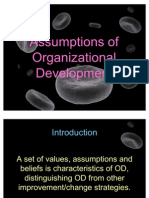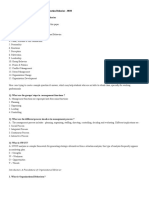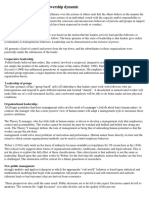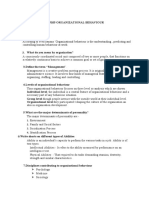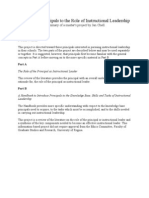Self Awareness Final
Self Awareness Final
Uploaded by
Tasrif KhaledCopyright:
Available Formats
Self Awareness Final
Self Awareness Final
Uploaded by
Tasrif KhaledCopyright
Available Formats
Share this document
Did you find this document useful?
Is this content inappropriate?
Copyright:
Available Formats
Self Awareness Final
Self Awareness Final
Uploaded by
Tasrif KhaledCopyright:
Available Formats
Research Topic: Self-Awareness
Managerial Skills Development
Presented To:
Jasim Uddin (JDn)
Presented By:
Group-6 26th February 2012
Submission date:
Self-Awareness
Prepared By
Kashfia Mahbub Tasrif Khaled Md. Muntasir Jashim Mohammed Hasan Rabbani
0910388030 0930284030 0930113030 0930620030
Md. Abdul Hasan Chowdhury 1010282030
1|Page
Self-Awareness
Table of Contents
Contents
1. Introduction 2. Topic Review & Analysis 3. Theoretical Framework 4. Relevant Examples & Feedbacks in Context of Bangladesh 5. Critical Analysis 6. Conclusion 7. References
Page Number
3 4-5 6-9 10-11
12-13 14 15-16
2|Page
Self-Awareness
INTRODUCTION
Self-awareness means knowing ones self at a deep level. According to Tao Tuz, Knowing other is wisdom, knowing yourself is Enlightenment. The challenges of todays organizations are to develop capabilities of continuous sensing, learning and adjusting to the dynamics of their environments (Magalahaes, 2004). And the requirements of these capabilities are developing Self-Awareness. Self-Awareness includes understanding ourselves. No one is perfect and of understanding of ourselves, our fears, the things which excite us can help to kive in the greater world and in harmony with others. Self-Awareness also includes the basics such as being clear about what we like to do and what we do not like. It is all about understanding and feeling comfortable with ones self behavior. According to Northup (2007) in todays fast paced world, change will happen and will affect everyone. Organizational change driven by technology and world competitiveness is transformational, not just directional. Effective CEOs who want to be in control of change in their organization know that positive change is leader directed and that leader must be self-aware. Successful leaders have a strong self-awareness and deeply understand their emotions, strengths, limitations, values and motives. They tend to be honest and realistic with themselves and towards organization. But the Organizations must have similar understanding. In personal and organizational in both areas managers must be realistic. They cannot rationalize problems away or convince themselves that the situation is different than it truly is.
3|Page
Self-Awareness
TOPIC REVIEW & ANALYSIS
After evaluating the overall case here we found that after the fall of 2008, in the peak of the financial crisis, it seemed like the world was going to end every weekend and Mr. Jhon Baldoni talked about some key managerial skills. Like firstly, every HR manager needs to be a good Listener & have a Good Communication Skill, it might sound easy and simple but in terms of becoming effective for the organization it is a critical thing. Managers really need to engage with people who have different opinions and also have to be ready and willing to accept critical inputs which can be beneficial for the organization. According to Anthony Beevo from his book D-Day, Eisenhower (a commander in WW II) was a fascinating leader because he was a great listener. He didnt shut any voice out, but was still able to make the tough decisions. So in times of coming of crisis a manager needs to be a good listener. He should have done more to anticipate the radical changes that occurred. Secondly, a HR manager must be aware of his Responsibilities. He needs to be what is going on in the whole organization, not only his own department. Thirdly, a successful HR manager should be a Feedback Seeker. He needs to ask more questions than to answer. He should welcome dissent and debate, and should constantly seek more intelligence. As leader, a big part of a managers job will be telling people what to do. But he has to remember that real intelligence comes more from asking then telling. Overall the case is about leaders must become system thinkers who are comfortable with ambiguity. Success requires problem solving, and connecting the dots. This requires intellectual breadth and tactical depth. Managers must understand technology, globalization, politics, economics, and human resources. They need to understand how government, community, the environment, business, academics all connect and they also must apply this to solving problems. Last, leaders must Motivate and Influence others. And above all a successful HR manager must be Self-Aware. A managers day is filled with lots of change and decision making. Many of these decisions include people. Every behavior by a manager has the potential to have a big impact on others. The selfaware manager understands this and thinks through decisions and communications with others before acting. According to Craig Nathanson, the self-aware manager tends to be calmer, have more empathy, and able to think through challenges much better. The self-aware manager is able to think from the others perspective which helps in people relationships, communications, and decision making. The manager must understand that to be proactive in todays competitive
4|Page
Self-Awareness
environment they must continually develop the strengths of their key people, share power with them and encourage active participation (Northup, 2007). A number of researchers have been exploring the psychological concept of Self-Awareness from an applied ratings-based perspective (e.g. Atwater & Yammarion, 1992; Van-Velsor, Taylor & Leslie, 1993). Many researchers (e.g. Ashford & Tsui, 1992; McCall, Lombardo & Morrison, 1998; Sintar, 1988) have argued that Self-Awareness is an important ability and skill set for achieving managerial excellence. Thus, better managers should be more skilled at assessing the level of their own believers and the impact those behaviors have on others. Moreover, high performance and high potentials in organizations should also exhibit greater levels of SelfAwareness because they apparently have already been identified as possessing promising managerial characteristics such as strong interpersonal leadership and communication skills (Derr, Jones & Tommey, 1988; Garfield, 1986) and are often given significantly greater development opportunities that serve to enhance their abilities. When the organization supports personal growth and self-awareness the overall group tends to help each other out more. People tend to show more care towards others, conflict at work is decreased and overall people get along better. The self-aware manager contributes more to society through actions and role modeling. Society over time benefits the most. Programs and strategies for building society take into account human factors and implications. There is more emphasis on understanding all the parts and how they make up the whole system. This type of thinking impacts decisions, strategies, and where we place our focus and effort.
5|Page
Self-Awareness
THEORETICAL FRAMEWORK
According to Carl Rogers, Becoming a person means that the individual moves toward being, knowingly and acceptingly, the process which she/he inwardly and actually is. Self-awareness is a broader concept that focuses on the image that an individual has of him/herself. Individual who is self-aware has a deep understanding of his/her emotions, strengths, weaknesses and drives. The definition of managerial self-awareness as the ability to reflect on accurately assesses one's own behaviors and skills as they are manifested in workplace interactions. Awareness of any discrepancy between how one see him/herself and how others see them enhances selfawareness, a key to maximum performance (McCarthy and Garavan 1999). McCarthy and Garavan 1999, argue that a cannily mentor can help one to attain higher levels of self-awareness by understanding their own emotions. The study of self-awareness continues to be a dynamic and active research area. Lots of research relevant to basic theoretical issues has been conducted. There are five most critical areas of self-awareness that have been found to be important in developing successful management.
6|Page
Self-Awareness
Core SelfEvaluation
Emotional Intelligence
Values
Attitudes Towards Change
Learning Style
Self-Understanding & Self-Management
Managerial Effectiveness, Job Satisfaction & Job Performance
Understanding Differences in Others
According to the Self-Awareness model Core Self-Evaluation is identifying ones underlying personality attributes. It is a belief about amount of control a person has over situations in their life. High performing managers are more self-aware (Church, 97) because they evaluate themselves. Self-Evaluation is all about Self-Esteem, Self-Efficacy, Emotional stability and Locus control which leads to Personality uniqueness, Job satisfaction, Job performance and leads a manager towards a happy life. Through Self-Efficacy and other evaluation process a manager is capable to perform in a certain manner or attain certain organizational goals. Second area of Self-Awareness is Values which identifies personal standards and moral judgments. Personal Values are the core of the dynamics of behavior, and play so large part in unifying personality (Allport, Gordon, & Vernon, 1931, p. 2). Personal Value helps to define morality and ethics.
7|Page
Self-Awareness
Two major types of values are considered: Instrumental Values which contain desirable standards of conduct for attaining an end and another one is Terminal Values which is desirable ends or goals for the individual (Rokeach, 1973). The values that managers desire are Sense of Accomplishment, Self-Respect, A comfortable Life and Independence. Third area of SelfAwareness is Learning Style which represents an individuals inclination to perceive, interpret and respond to information in a certain way. Fourth area is attitude Towards Chan which identifies adaptability and responsibility. The sooner the managers adapt the cultural affairs of the organization the more success they achieve. And final area is Emotional Intelligence which identifies the emotional awareness and control. Emotional Intelligence is difficult to measure and define. It is considered to be important measures of managerial success. Based on these five critical areas, the employees and managers of Square Pharmaceuticals practiced each of these portions with great care. They implemented the best assessment styles in the business with relevant accessible models. By this, the employees developed their core competencies with greater values and adapted their environment by the passing of time. This resulted to the market position of the company. For this the company will be forever thankful to their HR department who always remained accessible for the employees in any kind of help. They understood what can boost the employee performance and what the employees will to be awarded. To perfect ones management skills, the best place to start is self-awareness. Self-awareness means knowing your values, personality, needs, habits, emotions, strengths, weaknesses, etc. Moreover, self-awareness allows one to motivate oneself and manage ones stress better, helps you with your intuitive decision making, and helps you to lead and motivate others more effectively. Self-awareness is very useful. Self-awareness helps managers identify gaps in their management skills, which promotes skill development. But self-awareness also helps managers find situations in which they will be most effective, assists with intuitive decision making, and aids stress management and motivation of oneself and others. Self-aware employees create an important source of competitive advantage for firms (Barney, 1991; Prefer 1994). Self-awareness helps manager to exploit their strengths and cope with their weaknesses. It's very difficult to cope with poor results when they don't understand what causes them. When a manager doesnt know what behaviors to change to
8|Page
Self-Awareness
improve his performance, he just feels helpless. Self-awareness is empowering because it can reveal where the performance problems are and indicate what can be done to improve performance. In addition, awareness of mangers psychological needs can increase his motivation by helping him understand and seek out the rewards that he really desires such as a sense of accomplishment, additional responsibility. Manager can become more self-aware by seeking feedback from the people who know you, completing self-assessment surveys, and hiring an expert like a professional counselor or executive coach. Many experts suggest that managers find a way to get anonymous feedback from staff members and co-workers. (e.g., Ed Eppley, Area Manager for Dale Carnegie Training, and Ellen Van Velsor of the Center for Creative Leadership) The contribution of individual understandings to the processing of information, decision making and memory function (e.g., Bandura & Jourden, 1991; Hendrick 1990; Lewicki, 1983) must also be considered as a potential moderator in any rating-based Self-Awareness. Individual differences in convergent theories of personality must also be considered in any attempt to explain differences in the level of an agreement in performance ratings. Both the Self-Monitoring (Snyder, 1974, 1987) and Self-Consciousness constructs (e.g., Buss, 1980; Fenigstein, 1987; Fenigstein et al., 1975) appear to have direct relevance to level of Self-Other agreement obtained if this measure in fact reflects an appropriate operationalization of Managerial Self-Awareness. In summary, Self-Monitoring Theory hypothesizes that individuals differ on the extent to which they actively monitor, regulate and control their own expressive behaviors in the presence of others. Lower Self-Monitor tends to behave according to their own inner states rather than external socially driven cues and Higher Self-Monitors behave in the opposite; that is they are driven by interpersonal situations rather than internal convictions (Briggs & Cheek, 1988; Snyder, 1987). Thus, High Self-Monitors are more likely to attend and assess their own behaviors in the workplace.
9|Page
Self-Awareness
RELEVANT EXAMPLES & FEEDBACKS IN CONTEXT OF BANGLADESH
It has been universally accepted that leadership style determines an Organizations long term success. Since employees always react to managements leadership style, proactive change is best carried out in an environment where employees feel valued, have the ability to help set direction and initiatives, can develop personally and know management has their best interests at heart which means the employees as well as management of an Organization must be SelfAware. We have conducted our research in tow Pharmaceutical Companies of Bangladesh and came to a conclusion how one company achieve its goal and success due to the concern of one of the most important the managerial skills which is Self-Awareness and other company failed for not concerning about it. According to the case How to crack the Self-Awareness Paradigm a manager should not imply various experiments that are time consuming. If he/she is a self-aware manager, he/she would operate works with delegation and utilizing time more in thinking to improve. SQUARE Pharmaceuticals top Manager practiced to use the time efficiently and effectively to improve things that has made the operation flexible gradually the time goes on. Through the research we came to know that Organizations benefit more from leaders who take responsibility for what they don't know than from leaders who pretend to know it all. Participating in person with the people in field hardly solve the things. A Self-Aware manager lets the employees to do their jobs. If they fail to do so he tries to find whether employees with different skills deal with it or it require proper training or more available resources. The HR of SQUARE PHARMA enriched their employees with sophisticated training or functional assessments, enough resources to make up their comfort zone. They managed place with the right skilled person for a job fit. Many experts suggest that managers find a way to get anonymous feedback from staff members and coworkers. (e.g., Ed Eppley, Area Manager for Dale Carnegie Training, and Ellen Van Velsor of the Center for Creative Leadership). On an interpersonal level, Self-Awareness on the basis of strengths and weaknesses can net the trust of others and increase employees credibility, which will be helpful to increase leadership effectiveness. One can become more Self-Aware by seeking feedback from the people who they know, completing Self-Assessment surveys, and
10 | P a g e
Self-Awareness
hiring an expert like a professional counselor or executive coach. A Self-Aware manager should be ready to accept any kind of feedbacks and complaints from the employees. SQUARE PHARMA has done their task with great responsibility in this sector. SQUARE deals with these criteria in a flexible way. They heard their employees so the employees up lifted the company by their competencies. We hardly came to know about a Pharmaceutical Company in Bangladesh name PHARMIC Pharmaceuticals. Because of their low performance in HR department and lack of SelfAwareness among the managers and employees the company is going through huge loss. The employees are not motivated in a positive way which has a very bad effect on the success of the company. The company does not give their employee proper time and support to know about their fault and learn from their mistakes. PHARMIC do not provide any additional training, resources and manpower that often. Besides these there are many lackings of Proper HR practice in PHARMIC Pharmacetucals which does not let their employees be Self-Aware.
11 | P a g e
Self-Awareness
CRITICAL ANALYSIS
Self-Awareness is an essential part in any organization. From the case How to crack the SelfAwareness Paradigm we came to know that how Mr. John Baldoni explains the necessity of Managerial Skill and Self-Awareness. Through critical evaluation and analysis the result of the study shows some limitations in distinctive organizational and social context. Although the Theoretical framework upholds influential academic approach still there are some conflicts in the application and implementation of Self-Awareness practices in the organization among the managers. Self-awareness, in general, continues to be difficult to define and measure. Across the research, inconsistencies in the measurement or definition of self-awareness may account for the differences in research findings. One of the Self-Awareness theories has proposed that there are five areas of Self-awareness. According to the first area Core Self-Evaluation is identifying ones underlying personality attributes and high performing managers are more Self-Aware as they evaluate themselves. But self-evaluation is a critical work. The managers must be brutally honest about their competency in the various categories. It is not a simple task because for selfevaluating one need to face the ability of accepting the criticisms but in terms of Bangladeshi context it is really hard to hear such negative criticism. Again another limitation is found in Emotional Intelligence which identifies the emotional awareness and control. But in context of Bangladesh people can hardly control their emotions. Most of the time executives as well as higher level managers generally get angry in stressful situation instead of looking at the problem and calmly finding the solution. So Emotional Intelligence is difficult to measure ad define. Becoming Self-Aware does not mean being selfish though. Discovering the inner part of oneself and by knowing others will benefit managers to build Self-Esteem and bring confidence by themselves. Another limitation is in the Self-Monitoring theory. It is not possible for a manager to actively monitor, regulate or control and measure his behaviors in presence of others. The measure of Self-Awareness becomes a gap between Self-Report and some objective. And the measurement becomes confusing between what is being asked in a Self-Report through Self-Monitoring and what is being objectively measured.
12 | P a g e
Self-Awareness
In PHARMIC PHARMA it is observed that the employees as well as the managers show low Self-Awareness and it is the main reason that the company is going through losses. They should provide some Functional Assessments to improve their employees managerial skills and to increase Self-Awareness. Functional assessment allows for the assessment of the specific demands of an individuals environment and the individuals performance in regards to those demands; this would provide a more ecologically valid measure for objective performance (Chaytor, Schmitter-Edgecombe, & Burr, 2006). PHARMIC PHARMA should position those assessments based on functioning in real world situation, may provide more appropriate objective standards for defining Self-Awareness. A main limitation of this research is its inability to clearly define Self-Awareness because SelfAwareness varies among individuals as well as in Organizations. Hoofien, Gilboa, Vakil, and Barak (2004) suggested that overall Self-Awareness is not as significant to or predictive of functional outcomes as Self-Awareness in specific domains.
13 | P a g e
Self-Awareness
CONCLUSION
Every Organization built on competitiveness in the market whether it is local organization or International. And in this competitive world it is not easy to establish trust. The managers of the organizations may face difficulties if their abilities of understanding and read others are poorly developed. Realistic vision and understanding Organizational behaviors or Co-workers is gained from Self-Awareness. Managers must gain the knowledge and skill how to be a good Leader. And a true Leader shares his value with others who must be able to demonstrate unseen soft qualities such as moral integrity, honesty, sincerity and true dedication. Insight brings focused Leadership. Focus drives performance and Performance drives result.
14 | P a g e
Self-Awareness
References
Allan, H., & Church, W., (2008). Managerial Self-Awareness in High-Performing Individuals in Organizations. Warner Burke Associates.
Ashford, S. J., & Tsui, A. S. (1991). Self-regulation for managerial effectiveness: The role of active feedback seeking. Aca d -emy of Management Journal,34, 251-280
Atwater, L. E., & Yammarino, F. J. (1992). Does self-other agreement on leadership perceptions moderate the validity of leadership and performance predictions? Personnel Psychology, 45, 141-164.
Barney, J. B. (1991). Firm resources and sustained competitive advantage. Journal of Management, 17, 99120
Derr, C. B., Jones, C., & Toomey, E. L. (1988). Managing highpotential employees: Current practices in thirty-three U. S. corporations. Human Resource Management, 27, 273-290.
Garfield, C. (1986). Peak performers: The new heroes of American business. New York: Avon Books.
Goldsmith, M. (2010, April). Be a Better Leader by Building Your Self-awareness. Retrieved from http://hbr.org/tip/2010/04/22/be-a-better-leader-by-building-your-self-awareness
Grover, R. (2003, December). Stalking a Wiley Prey at Disney. Retrieved from http://www.businessweek.com/bwdaily/dnflash/dec2003/nf2003122_5238_db035.htm
McCall, M.W., Jr., Lombardo, M.M., & Morrison, A.M. (1988). The lessons of experience: How successful executives develop on the job. Lexington, MA: Lexington Books.
15 | P a g e
Self-Awareness
Northup, T. (2007). Awareness: The Key Insight for Organizational Change.
Sinetar, M. (1988). Building trust into corporate relationships. Organizational Dynamics, 16(3), 73-79.
Velsor, E., Taylor, S., & Leslie, J. B. (1993). An examination of the relationships among selfperception accuracy, selfawareness, gender, and leader effectiveness. Human Resource Management, 32 (2-3), 249-263.
16 | P a g e
You might also like
- Attitude Survey: Mark Douglas - Trading in The ZoneDocument3 pagesAttitude Survey: Mark Douglas - Trading in The ZoneFadhl Almaflahi100% (1)
- Organizational Behavior Directed StudyDocument37 pagesOrganizational Behavior Directed StudyBrenda Williams PughNo ratings yet
- Neumann - Kurt Lewin at The Tavistock InstituteDocument18 pagesNeumann - Kurt Lewin at The Tavistock InstituteThe Tavistock Institute of Human Relations100% (1)
- Berlo's SMCR Model of CommunicationDocument22 pagesBerlo's SMCR Model of CommunicationJared MabulayNo ratings yet
- Org Beh Response Sheet 1Document4 pagesOrg Beh Response Sheet 1tomohdNo ratings yet
- Developing Global Management CompentenciesDocument12 pagesDeveloping Global Management Compentenciespratik_pro100% (1)
- The Focused Leader - How Effective Executives Direct Their Own and Organizations AttentionDocument6 pagesThe Focused Leader - How Effective Executives Direct Their Own and Organizations AttentionbukhariNo ratings yet
- Self-Awareness Is Crucial To Individual LeadershipDocument13 pagesSelf-Awareness Is Crucial To Individual LeadershipLakes SunriseNo ratings yet
- 0rder 380 Personal Leader ModelDocument7 pages0rder 380 Personal Leader Modeljoshua chegeNo ratings yet
- Assumptions of Organizational Development (Nursing Administration 3)Document28 pagesAssumptions of Organizational Development (Nursing Administration 3)Yoyen Gonzaga0% (1)
- Pom AssignmentDocument7 pagesPom AssignmentChahak LohiaNo ratings yet
- Interpersonal Behaviour, Power & PoliticsDocument29 pagesInterpersonal Behaviour, Power & PoliticsAman TiwaryNo ratings yet
- Discussions and ReviewsDocument8 pagesDiscussions and ReviewsRose John SupranesNo ratings yet
- Ingles Principles (Summary Ch1-2) PDFDocument5 pagesIngles Principles (Summary Ch1-2) PDFDiana Anali De la Cruz MiguelNo ratings yet
- MB0038 - Management Process and Organization Behavior-Feb-11.PDF 2011 01Document9 pagesMB0038 - Management Process and Organization Behavior-Feb-11.PDF 2011 01Uttam SinghNo ratings yet
- Values and Assumptions of OdDocument13 pagesValues and Assumptions of OdSankari SNo ratings yet
- Organisational Behaviour ModelDocument15 pagesOrganisational Behaviour ModelBelay AdamuNo ratings yet
- Personality DevelopmentDocument17 pagesPersonality Developmentfshe26No ratings yet
- Rheas Leadership CompetenciesDocument5 pagesRheas Leadership Competenciesapi-328638703No ratings yet
- ThesisDocument36 pagesThesisSandra Openio100% (6)
- Organizational Behavior Revision SheetDocument7 pagesOrganizational Behavior Revision SheetHisham MahamedNo ratings yet
- Management Process and Organisation BehaviorDocument34 pagesManagement Process and Organisation BehaviorsoumyashriNo ratings yet
- Week 2 LecturasDocument6 pagesWeek 2 LecturasrvlucianoNo ratings yet
- On The Role of Emotional Intelligence in OrganizationsDocument20 pagesOn The Role of Emotional Intelligence in OrganizationsDontNagNo ratings yet
- Emotinal Intelligence and LeadershipDocument26 pagesEmotinal Intelligence and Leadershipnurrahmasia raraNo ratings yet
- B.R ChaptersDocument37 pagesB.R ChaptersSachin BhatiNo ratings yet
- Individual and Group Behaviour in An OrganizationDocument8 pagesIndividual and Group Behaviour in An OrganizationpiusNo ratings yet
- Answer Key of OBDocument5 pagesAnswer Key of OBTigy VarugheseNo ratings yet
- Mba Assignment 4Document7 pagesMba Assignment 4Ankit JugranNo ratings yet
- Success Formula: Positive AttitudeDocument35 pagesSuccess Formula: Positive AttitudearunbiswalNo ratings yet
- Bekele AssignmentDocument9 pagesBekele Assignmenttsegab bekeleNo ratings yet
- Midterm ReviewerDocument9 pagesMidterm ReviewerRemrose DechillaNo ratings yet
- B&W 310123Document36 pagesB&W 310123Sachin BhatiNo ratings yet
- By The End of This Topic The Learner Should Be Able ToDocument45 pagesBy The End of This Topic The Learner Should Be Able Todmona8814No ratings yet
- 2.history of Organizational Development FinalDocument26 pages2.history of Organizational Development FinalSachin Macwan100% (1)
- EDL 101 Management Function BehaviorDocument12 pagesEDL 101 Management Function Behaviorakash deepNo ratings yet
- Module 4 SendDocument78 pagesModule 4 Sendd4gdvyn2hdNo ratings yet
- Consistent Pattern of Behaviour".: Transactional AnalysisDocument14 pagesConsistent Pattern of Behaviour".: Transactional AnalysisGoutham KanukolluNo ratings yet
- Servant TheoryDocument11 pagesServant TheoryGeorgeEchevarriaNo ratings yet
- Ob Cheat RemakeDocument10 pagesOb Cheat Remakerockeypockey6No ratings yet
- ReportDocument4 pagesReportcristinejose19No ratings yet
- Handbook for Strategic HR - Section 3: Use of Self as an Instrument of ChangeFrom EverandHandbook for Strategic HR - Section 3: Use of Self as an Instrument of ChangeNo ratings yet
- Chapter One Management SkillsDocument15 pagesChapter One Management SkillsChuma Chumzee EnwezorNo ratings yet
- ASSIGNMENT ORGANIZATIONAL BEHAVIOUR - Without Cover PageDocument12 pagesASSIGNMENT ORGANIZATIONAL BEHAVIOUR - Without Cover PagebeyonnetshNo ratings yet
- BMS OB Module 1Document39 pagesBMS OB Module 1Foram VasaniNo ratings yet
- Human Behavior in An OrganizationDocument34 pagesHuman Behavior in An Organizationsteve dela rosa100% (1)
- Ob (2) DDWDocument10 pagesOb (2) DDWRajarshi ChakrabortyNo ratings yet
- EFFECTIVE LEADER SeminarDocument20 pagesEFFECTIVE LEADER SeminarpriyaNo ratings yet
- Part 4 Leading Directing PDFDocument44 pagesPart 4 Leading Directing PDFAlex N. Mabalot100% (1)
- Workplace Motivation and Leadership: A Precondition or An ObligationDocument5 pagesWorkplace Motivation and Leadership: A Precondition or An ObligationHardeep KaurNo ratings yet
- Individual Differences and Environmental Factors Influence Human Behavior PsychologyDocument6 pagesIndividual Differences and Environmental Factors Influence Human Behavior PsychologyTsegaye AndargieNo ratings yet
- Independent Study in Group DyynamicsDocument24 pagesIndependent Study in Group DyynamicsKristel roselaine CrusperoNo ratings yet
- Values, Assumptions and Beliefs in ODDocument24 pagesValues, Assumptions and Beliefs in ODPhoenix D RajputGirlNo ratings yet
- Ch-1 Introduction: Definitions of OBDocument9 pagesCh-1 Introduction: Definitions of OBkavitachordiya86No ratings yet
- Collaborative Writing FinalDocument18 pagesCollaborative Writing Finalapi-218637354No ratings yet
- Assignment 3Document12 pagesAssignment 3Syed Muhammad Moin Ud Din SajjadNo ratings yet
- Behavior Organizational TutoríaDocument31 pagesBehavior Organizational TutoríaEmily OsoriNo ratings yet
- IM Unit 1 - Part III - Functions - of - Management - Leadership, Motivation, Communication.Document30 pagesIM Unit 1 - Part III - Functions - of - Management - Leadership, Motivation, Communication.Ruturaj MoreNo ratings yet
- Ba5105 Organizational BehaviourDocument8 pagesBa5105 Organizational BehaviourKavin RajNo ratings yet
- OB Janak AsignmentDocument6 pagesOB Janak Asignmentsumanchaudhary19876No ratings yet
- Organisation BehavourDocument9 pagesOrganisation BehavourNageshwar SinghNo ratings yet
- Learning Styles: All Students Are Created Equally (And Differently.)Document2 pagesLearning Styles: All Students Are Created Equally (And Differently.)Mirela Kadić - KrečinićNo ratings yet
- Expert System Development and PitfallsDocument26 pagesExpert System Development and PitfallsRanganath Sri100% (3)
- Character and LeadershipDocument9 pagesCharacter and Leadershipyenni juliana sibaraniNo ratings yet
- Unit Test 1Document2 pagesUnit Test 1Margerie FrueldaNo ratings yet
- Piaget's Theory of LearningDocument24 pagesPiaget's Theory of LearningMuhammad Salman AhmedNo ratings yet
- Chapter 18 Theoretical Bases For Promoting Family HealthDocument43 pagesChapter 18 Theoretical Bases For Promoting Family Healthbaashe100% (2)
- Gestalt PsychologyDocument5 pagesGestalt PsychologyJoanBangitNo ratings yet
- Esej TeamworkDocument2 pagesEsej TeamworkSeminarski RadoviNo ratings yet
- Teacher DevelopmentDocument10 pagesTeacher Developmentmkunalan23No ratings yet
- Stevenpeliaripdf 121030190143 Phpapp01 PDFDocument12 pagesStevenpeliaripdf 121030190143 Phpapp01 PDFMahendra BairathiNo ratings yet
- 1516 Tamayo CarolynDocument33 pages1516 Tamayo CarolynfcabelloluqueNo ratings yet
- MC Team DevelopmentDocument2 pagesMC Team DevelopmentNhan Phan0% (1)
- Wk1 - What Is ScienceDocument12 pagesWk1 - What Is Sciencechuaew100% (1)
- Process Control Lab ManualDocument51 pagesProcess Control Lab Manualkaushikei22100% (2)
- Fuzzy LogicDocument15 pagesFuzzy Logicshibu100No ratings yet
- Spirituality PresentationDocument11 pagesSpirituality PresentationMichael HernandezNo ratings yet
- Introducing Principals To The Role of Instructional LeadershipDocument39 pagesIntroducing Principals To The Role of Instructional LeadershipRidhwan ZalayNo ratings yet
- HRD ToolsDocument17 pagesHRD Toolsamirin_kingNo ratings yet
- Leadership & Team BuildingDocument45 pagesLeadership & Team BuildingSachita Nand Mishra100% (1)
- The Impact of Music in MemoryDocument9 pagesThe Impact of Music in MemoryM Irfan Riyadi100% (1)
- KM IntroductionDocument34 pagesKM Introduction9986212378No ratings yet
- Social Values and AttitudeDocument24 pagesSocial Values and AttitudeAsif Mohammed75% (4)
- Strategic Management & Business Policy: Thomas L. Wheelen J. David HungerDocument19 pagesStrategic Management & Business Policy: Thomas L. Wheelen J. David HungerAteeq Ur Rehman0% (1)
- Communication Is A Process by Which You Convey Your Message To Someone or A Group of PeopleDocument2 pagesCommunication Is A Process by Which You Convey Your Message To Someone or A Group of PeopleSidra NaeemNo ratings yet
- Narrative Report On SLAC MArchDocument12 pagesNarrative Report On SLAC MArchSonny MatiasNo ratings yet
- Case Study - Contrasting Psychodrama & Systemic Constellation WorkDocument11 pagesCase Study - Contrasting Psychodrama & Systemic Constellation WorkKaren Carnabucci100% (1)
- CHP 2018 n2 Kulagina ApasovaDocument11 pagesCHP 2018 n2 Kulagina ApasovavaleskaNo ratings yet









